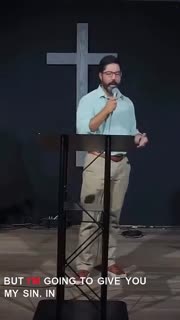Generosity vs. Greed: Lessons from the Early Church
Devotional
Sermon Summary
Bible Study Guide
Sermon Clips
1. "The reality is you don't see a lot of conflict in church between people that are givers. People that are generous, people that are givers, people that come to the body to contribute and to give of themselves, whether it's resources, time, energy, words of encouragement. There's not a lot of conflict that goes on between the givers of a church. Now, where there's division, it really comes down to those that I would consider the takers, right? It's typically those that are the takers that cause division, cause strife, cause conflict within a church." [28:33] (38 seconds)
2. "There's never a stampede, right? There's always order. There's peace. There's harmony. Because what's in the hearts of those people is generosity of giving. That's what is going on in that situation. And so here we see in the early church that the Holy Spirit causes these believers to be generous, to meet the needs of one another. And it says they're of one heart and one soul. Generous people tend to get along. Generous people tend to build unity. Unity within the body of Christ." [30:45] (32 seconds)
3. "When we give to the kingdom, When we give to the furtherance of this mission, There are going to be people in heaven that you're going to meet that are there because of your giving. You may not know who those people are now when you give to mission, When you give to church, When you give to the furtherance of the kingdom. You may not know what that looks like now. But there are going to be people in heaven that you're going to meet that are there because you gave generously. And so generosity furthers the mission of the kingdom, secondly." [32:16] (31 seconds)
4. "What you have with a church marked by generosity is that needs are met. Needs are met in the church. And what happened here in the early church in Acts is that what we see is the Holy Spirit is initiating amongst the members these spontaneous acts of giving. Spontaneous acts of generosity. It was all voluntary. None of it was compulsory. None of it was mandated. In fact, you don't see anywhere in the Bible, anywhere in the New Testament letters. Any rule or law that the church members sell their land and sell their property and give it to the church. That's never like a rule that was laid out." [33:11] (39 seconds)
5. "Generosity marks leadership. Marks leadership within the church. Here, Barnabas sets an example of generous giving as a leader. And what is he called? He's called the son of encouragement. Why? Because he set an example of giving. He set an example of generosity. And, yes, this was all voluntary. But when it comes to leadership within the church, leaders should be marked by generosity. For those of you that are educators in the room, some of you teachers, what's that? That one saying leaders are readers? Or is it backwards? Readers are leaders? Well, when it comes to the kingdom, leaders are givers. Leaders are givers. Those that seek to lead by serving should be the most generous givers. We see that here with Barnabas, that generosity marks leadership." [37:16] (52 seconds)
6. "The issue with money is it always reveals our heart. That's why it's so challenging. It reveals the idols in our hearts. John Calvin famously said the human heart is an idol factory. It's an idol factory. And what that means is our hearts are always looking for things to worship. And the thing is, money is not what we worship. Ultimately, money is the means by which we worship either God or our idols. And I'll say that again. Money is not what we worship. Money is a tool or the means by which we worship. Money is a tool or the means by which we worship God or our idols." [47:37] (37 seconds)
7. "Here's the beautiful thing about Christianity. Is that before God gives you or rather before you give anything, God gives you everything. Before you give anything, God gives you everything. That's why the gospel is different than any other religion. Because before you give anything, God gives you everything. Because our God is a giver. He's not a taker. You see, the only thing you're required to give to God to become a Christian is what? Your sin. Right? For those of you here today, maybe you're not yet a believer. And you wonder, how can I become a Christian? Well, the only thing that God requires of you to enter his kingdom, to become a Christian, to give to him, is to give him your sin. To say, Lord, I'm tired of my sin. I have a debt I can't pay." [53:39] (57 seconds)
8. "But I'm going to give you my sin. In order so that you can give me your righteousness. You can give me your salvation. Your forgiveness. Your eternal life. Your promise of heaven. Adoption into your family. Right? That's all God wants from us is to give him our sin and he gives us back his righteousness, his forgiveness, his grace, his mercy. The promise of heaven one day being in these perfect bodies healed as we talked about a couple of weeks ago. And so Jesus goes to the cross. He pays the debt that we owe God. And then after that he invites you and I to be on mission with him. To introduce other people to our Savior. To introduce other people to this message of salvation." [54:39] (41 seconds)
9. "And he calls us to further the kingdom. And some of that is through our giving. Some of that is through our relationships. But bottom line is that God loves a cheerful giver because there's no one more joyful than God. He is the ultimate giver. And when you and I get God's heart. Then you and I become generous. And we become joyful. And when you experience the joy of giving and you get to see others experience his grace through your generosity. Then it makes your heart that much more full. Makes you that much more joyful. And so today we saw the vivid contrast between generosity and greed. And God is calling us like the early church to be full of his spirit. Full of generosity. So that we build his kingdom rather than tear it down." [55:20] (47 seconds)
Ask a question about this sermon
2. "There's never a stampede, right? There's always order. There's peace. There's harmony. Because what's in the hearts of those people is generosity of giving. That's what is going on in that situation. And so here we see in the early church that the Holy Spirit causes these believers to be generous, to meet the needs of one another. And it says they're of one heart and one soul. Generous people tend to get along. Generous people tend to build unity. Unity within the body of Christ." [30:45] (32 seconds)
3. "When we give to the kingdom, When we give to the furtherance of this mission, There are going to be people in heaven that you're going to meet that are there because of your giving. You may not know who those people are now when you give to mission, When you give to church, When you give to the furtherance of the kingdom. You may not know what that looks like now. But there are going to be people in heaven that you're going to meet that are there because you gave generously. And so generosity furthers the mission of the kingdom, secondly." [32:16] (31 seconds)
4. "What you have with a church marked by generosity is that needs are met. Needs are met in the church. And what happened here in the early church in Acts is that what we see is the Holy Spirit is initiating amongst the members these spontaneous acts of giving. Spontaneous acts of generosity. It was all voluntary. None of it was compulsory. None of it was mandated. In fact, you don't see anywhere in the Bible, anywhere in the New Testament letters. Any rule or law that the church members sell their land and sell their property and give it to the church. That's never like a rule that was laid out." [33:11] (39 seconds)
5. "Generosity marks leadership. Marks leadership within the church. Here, Barnabas sets an example of generous giving as a leader. And what is he called? He's called the son of encouragement. Why? Because he set an example of giving. He set an example of generosity. And, yes, this was all voluntary. But when it comes to leadership within the church, leaders should be marked by generosity. For those of you that are educators in the room, some of you teachers, what's that? That one saying leaders are readers? Or is it backwards? Readers are leaders? Well, when it comes to the kingdom, leaders are givers. Leaders are givers. Those that seek to lead by serving should be the most generous givers. We see that here with Barnabas, that generosity marks leadership." [37:16] (52 seconds)
6. "The issue with money is it always reveals our heart. That's why it's so challenging. It reveals the idols in our hearts. John Calvin famously said the human heart is an idol factory. It's an idol factory. And what that means is our hearts are always looking for things to worship. And the thing is, money is not what we worship. Ultimately, money is the means by which we worship either God or our idols. And I'll say that again. Money is not what we worship. Money is a tool or the means by which we worship. Money is a tool or the means by which we worship God or our idols." [47:37] (37 seconds)
7. "Here's the beautiful thing about Christianity. Is that before God gives you or rather before you give anything, God gives you everything. Before you give anything, God gives you everything. That's why the gospel is different than any other religion. Because before you give anything, God gives you everything. Because our God is a giver. He's not a taker. You see, the only thing you're required to give to God to become a Christian is what? Your sin. Right? For those of you here today, maybe you're not yet a believer. And you wonder, how can I become a Christian? Well, the only thing that God requires of you to enter his kingdom, to become a Christian, to give to him, is to give him your sin. To say, Lord, I'm tired of my sin. I have a debt I can't pay." [53:39] (57 seconds)
8. "But I'm going to give you my sin. In order so that you can give me your righteousness. You can give me your salvation. Your forgiveness. Your eternal life. Your promise of heaven. Adoption into your family. Right? That's all God wants from us is to give him our sin and he gives us back his righteousness, his forgiveness, his grace, his mercy. The promise of heaven one day being in these perfect bodies healed as we talked about a couple of weeks ago. And so Jesus goes to the cross. He pays the debt that we owe God. And then after that he invites you and I to be on mission with him. To introduce other people to our Savior. To introduce other people to this message of salvation." [54:39] (41 seconds)
9. "And he calls us to further the kingdom. And some of that is through our giving. Some of that is through our relationships. But bottom line is that God loves a cheerful giver because there's no one more joyful than God. He is the ultimate giver. And when you and I get God's heart. Then you and I become generous. And we become joyful. And when you experience the joy of giving and you get to see others experience his grace through your generosity. Then it makes your heart that much more full. Makes you that much more joyful. And so today we saw the vivid contrast between generosity and greed. And God is calling us like the early church to be full of his spirit. Full of generosity. So that we build his kingdom rather than tear it down." [55:20] (47 seconds)









